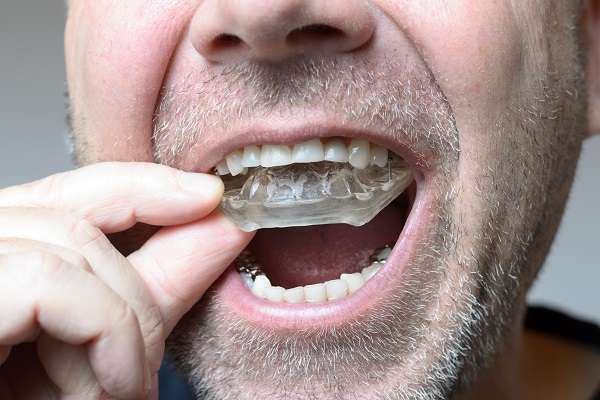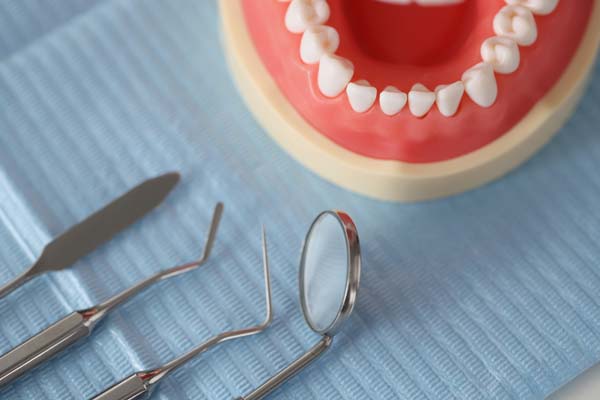Bite Guards to Deal with TMJ

If you have recently been diagnosed with TMJ disorder, a dentist might recommend getting a bite guard to ease the symptoms. TMJ disorder causes symptoms such as earaches, headaches and facial pain. Since the symptoms worsen gradually and appear unrelated, the condition can go undiagnosed and untreated, and it affects a patient's quality of life.
Treating and diagnosing TMJ disorder
Several factors can contribute to problems with the temporomandibular joint (TMJ), including posture, arthritis, injury and teeth grinding. Visiting the dentist is necessary after experiencing the symptoms of the condition to get a diagnosis and suitable treatment options for relief. If minor lifestyle changes (like eating soft foods, stress-relieving therapy, using ice and preventing undue stress on the jaw) do not cause significant changes, the dentist may recommend a bite guard to alleviate the symptoms of TMJ disorder.
How bite guards help with TMJ
Bite guards, also called mouthguard or a stabilization splint, are created from hard acrylic resin. Different designs are available, but all follow the same mechanism: They fit over the upper and lower teeth to stop teeth grinding or clenching or restore the jaw to its correct position. They are practical, particularly for those who deal with teeth grinding. Common types of bite guards for TMJ disorder include:
- Stabilization or flat plane splint: This mouthguard covers the surface of the teeth completely to limit grinding and reduce jaw tension
- Repositioning splint: This bite guard functions by shifting the lower jaw (mandible) forward or backward to relieve pressure on the jaw joints. There is the risk of permanent changes to the bite, so it should only be used for a limited period under a dentist's supervision
- Modified Hawley splint: This guard goes over the upper teeth. Its reach only extends to the upper jaw and the six lower front teeth, therefore stopping the back teeth from contacting each other. This mechanism inhibits grinding and clenching and relieves pressure on the temporomandibular joint
- Nociceptive trigeminal inhibition tension suppression System (NTI-TSS): This device functions like the modified Hawley splint, but in this case, it only contacts the upper front teeth and lower teeth. It will stop teeth grinding but may put more stress on only a few teeth
Points to consider
If the patient notices pain or inconvenience while wearing the guard, or new pain develops, they will need to stop using the device and contact the dentist. Although there are over-the-counter mouthguards available, every mouth is unique, so a one-size-fits-all product will not be effective and may do more harm than good. It is advisable to only get a mouthguard provided by a dentist.
The dentist will design the device based on the impressions made from the patient's mouth. The bite guard will be adjusted to fit inside the mouth. Patients will also get specific instructions on how to wear the mouthguard.
Do you suffer from TMJ disorder?
If you are experiencing any of the symptoms of TMJ, you should visit a dental office for diagnosis and treatment. The dentist will address your concerns and recommend the best treatment option, such as bite guards.
Request an appointment here: https://shdentalva.com or call Safe Harbor Dental at (757) 333-0087 for an appointment in our Chesapeake office.
Check out what others are saying about our dental services on Yelp: TMJ in Chesapeake, VA.
Related Posts
Anyone considering dental veneers should understand the details of how they work to help determine if they are candidates. These thin, shell-like pieces are a cosmetic dentistry treatment that enhances the overall appearance of the teeth. Here are the various ways that general dentists utilize veneers for their patients.Veneers are thin porcelain shells that a…
If you have recently replaced a mouthful of teeth, you are probably adjusting to new dentures. Although dentures greatly improve your smile, this does not mean you immediately become used to wearing them. The good news is there are methods you can use to help adjust, and in about a month, your dentures should start…
Composite dental fillings are one of the popular ways to deal with tooth decay nowadays. These restorations do not last forever, but they can last up to 10 years with good oral hygiene. Composites can be color-matched with your teeth so that any repairs made with them blend in with the rest of your teeth.…
A family dentist may have suggested getting dental sealants during your last appointment. With tooth decay being the most common oral issue in children between the ages of six and 19, according to the CDC, dental sealants provide extra protection for the teeth to prevent its occurrence and resulting dental problems. This article explains why…


